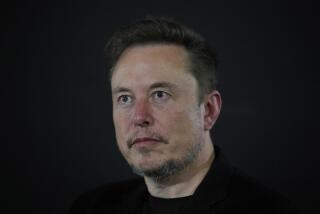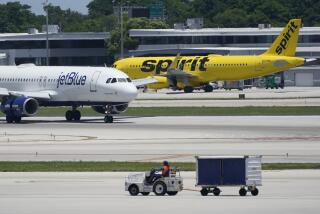Oracle Can Pursue Hostile Bid for PeopleSoft, Judge Decides
SAN FRANCISCO — In a rare defeat for U.S. antitrust enforcers, a federal judge cleared the way Thursday for software giant Oracle Corp. to press ahead with its hostile bid for rival PeopleSoft Inc.
Oracle still faces major obstacles to completing the $7.7-billion deal, including the entrenched opposition of PeopleSoft directors and Chief Executive Craig Conway, a onetime protege of Oracle CEO Larry Ellison.
But Thursday’s court victory, once seen as longshot, boosted Oracle’s chances.
“This is the most significant hurdle,” said David Yockelson, an analyst at Meta Group.
PeopleSoft shares surged nearly 14% on Nasdaq after U.S. District Judge Vaughn Walker issued his 164-page decision. They rose from $17.95 to $20.40 in after-hours trading, just shy of Oracle’s $21 tender offer, suggesting that investors believe Oracle could win its 15-month battle.
Oracle stock, which closed at $9.93 on Nasdaq, rose to $10.21 in late trading.
Redwood Shores, Calif.-based Oracle launched its bid for Pleasanton, Calif.-based PeopleSoft in June 2003 in an effort to challenge industry leader SAP of Germany in the market for the sophisticated software that manages the back-office functions of big companies.
PeopleSoft rebuffed Oracle’s offer several times before the Justice Department sued to block the proposed union in February. During a six-week trial that began in June, the government argued that prices would rise if large corporate customers could choose only between Oracle and SAP.
But Judge Walker ruled that the government lawyers had defined the market too narrowly and should have given more weight to competition from Microsoft Corp. and others.
The Justice Department said it might challenge the decision, and Walker stayed his order for 10 days to allow for an appeal.
Attorneys predicted that the Justice Department would face a difficult road because the judge quarreled not only with the legal issues presented in the case but also with the quality of witness testimony. “If witness credibility is a factor, it’s very unlikely an appellate court would reverse that,” said Paul Griffin, an antitrust lawyer with Thelen Reid & Priest.
Although the Justice Department rarely loses antitrust trials, legal observers predicated that Thursday’s ruling would not curb the government’s enforcement efforts. “It’s all about the facts, and the facts are different in every case,” said Fenwick & West antitrust specialist Mark Ostrau. “It’s not like this case will scale back what cases the government is likely to bring.”
European antitrust regulators also are reviewing Oracle’s bid.
Still, the decision could spur certain acquisitions that might have been considered off-limits, especially in technology.
“To the degree this represents a rejection of a niche view of software markets, it could trigger a lot of merger and acquisition activity by companies that would have thought they would have had no chance for approval,” said professor Andrew Gavil, who teaches antitrust law at Howard University in Washington.
PeopleSoft said Thursday that its directors would continue to discuss Oracle’s bid, but it offered no sign of retreat. The board has clung to a “poison pill” takeover defense to thwart Oracle. The measure, instituted years ago, snaps into effect when an unwelcome buyer acquires 20% or more of the company’s shares.
At that point, executives are allowed to issue millions of shares to all other stockholders, thereby making a takeover prohibitively expensive and diluting the hostile buyer’s ownership. Oracle has sued PeopleSoft to force it to disable its poison pill. PeopleSoft, meanwhile, has its own lawsuit pending over Oracle’s tactics.
So far, 7% of PeopleSoft stockholders have tendered their shares to Oracle.
“This decision puts the onus squarely on the board of PeopleSoft to meet with us and to redeem their poison pill so that the shareholders can accept our offer,” Oracle Chairman Jeffrey O. Henley said in a statement.
Oracle bucked Silicon Valley tradition by pursuing a hostile takeover in the software industry, where it is widely feared that prized employees may flee after an unwanted acquisition. In this case, Oracle said early in its campaign that it wanted to cut PeopleSoft staff and shift customers to Oracle products.
Oracle originally had planned to drop its bid if the Justice Department objected, and most legal analysts gave the company little chance of prevailing once it decided to fight it out in court. That sentiment shifted, though, as the government’s witnesses offered vague and sometimes contradictory testimony during the trial.
In his ruling, Walker found fault with nearly all of the government’s case, observing that several witnesses appeared to suffer from “amnesia” when asked to recall big software contracts that PeopleSoft lost to companies other than SAP and Oracle.
In fact, PeopleSoft lost contracts to smaller competitors such as Lawson Software Inc.
Walker agreed with Oracle that Lawson, Microsoft and others provide real competition already and might expand further if a merger led to price increases of more than 10%.
In particular, Walker dismissed as “incredible” Microsoft executive Doug Burgum’s testimony that the company didn’t have the sales staff and the know-how to go after the biggest customers with its relatively new suite of business software.
The biggest problems Walker saw, though, were with the very basics of the case. Government lawyers maintained that SAP, Oracle and PeopleSoft were the only significant providers of “high-function” human resources and financial software to “large complex enterprises.”
But “ ‘high-function software,’ as defined by plaintiffs, has no recognized meaning in the industry,” Walker wrote. And the programs sold for hundreds of thousands of dollars to the biggest customers are essentially the same programs sold for less to much smaller firms, he concluded.
For good measure, Walker rejected the government’s contention that a distinct market exists in the United States, which would have made SAP seem less of a competitive force than it is.
With that wholesale dismantling of the definition of the market, the government failed to prove that a combined Oracle-PeopleSoft would be the dominant player. For all the testimony in the case, Walker added, solid market share information was “startling sparse.”






